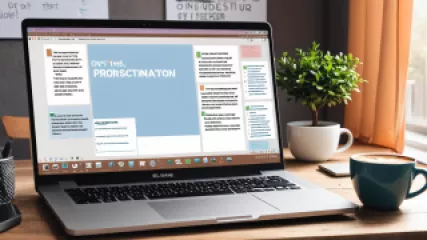Learning to Stop Procrastinating: Lessons from Fiction
Have you ever found yourself putting off important tasks, only to regret it later? Procrastination is a common struggle that many people face. It can be difficult to overcome this habit, but there are various strategies and techniques that can help. In this article, we will explore the topic of procrastination and discuss how we can learn valuable lessons from fiction to stop procrastinating.
The Nature of Procrastination
Procrastination is the act of delaying or postponing tasks, often opting for more pleasurable or easier activities instead. While it may provide temporary relief, procrastination can lead to increased stress, missed deadlines, and a lack of productivity. Understanding the root causes of procrastination is essential in finding effective solutions to overcome it.
There are several factors that contribute to procrastination:
- Lack of motivation: When we lack motivation or find a task overwhelming, we tend to postpone it.
- Fear of failure: The fear of not meeting expectations or making mistakes can paralyze us, leading to procrastination.
- Perfectionism: Striving for perfection can create a fear of not achieving it, causing us to delay starting a task.
- Distractions: The constant lure of social media, entertainment, and other distractions can easily divert our attention from important tasks.
Learning from Fiction
Fictional stories have the power to captivate our imagination and transport us to different worlds. They also provide valuable insights and lessons that can be applied to real-life situations. By exploring fictional characters and their experiences with procrastination, we can gain new perspectives and learn effective strategies to overcome this habit.
1. Donnie Banks: Embracing Imperfection
In the novel "The Journey Within," Donnie Banks, a young artist, struggles with procrastination due to his fear of failure. Donnie is afraid that his artwork will not live up to his own high standards or the expectations of others. As a result, he constantly delays starting new projects.
However, throughout the story, Donnie learns the importance of embracing imperfection and taking imperfect action. He realizes that waiting for the perfect moment or perfecting every detail only hinders his progress. By accepting that mistakes are a natural part of the creative process, Donnie begins to overcome his procrastination and allows himself to grow as an artist.
2. Waldo Cunningham: Breaking Tasks into Smaller Steps
In the movie "A Leap of Faith," Waldo Cunningham, a struggling entrepreneur, finds himself overwhelmed by the numerous tasks involved in starting his own business. He becomes paralyzed by the magnitude of the work and consistently puts off taking action.
Through a chance encounter with a successful business owner, Waldo learns the importance of breaking tasks into smaller, manageable steps. Instead of focusing on the overwhelming whole, he starts dividing his goals into actionable tasks. This method helps him overcome procrastination by making the workload more approachable and less intimidating.
3. Kate Hansen: Creating a Structured Routine
In the novel series "The Time Traveler's Chronicles," Kate Hansen, a historian, frequently struggles with procrastination due to her inclination to prioritize leisure activities over her research. She finds it challenging to maintain focus and discipline in her work.
Throughout the series, Kate learns the significance of creating a structured routine. By establishing specific times dedicated to her research and setting achievable goals, she becomes more organized and efficient. This newfound structure helps her combat procrastination and achieve her academic aspirations.
4. Madison Sullivan: Utilizing Accountability Partners
In the book "The Power of Collaboration," Madison Sullivan, an aspiring writer, battles with procrastination caused by self-doubt and a lack of external accountability. She often avoids writing and finds excuses to postpone her creative endeavors.
However, Madison discovers the power of accountability partners in overcoming procrastination. By joining a writing group and regularly sharing her progress and goals with fellow writers, she creates a sense of responsibility towards her craft. The support and encouragement from her peers help her stay motivated and accountable, ultimately breaking the cycle of procrastination.
Applying the Lessons
Now that we have explored the lessons learned from fictional characters, it's time to apply these insights to our own lives. Here are some practical steps you can take to overcome procrastination:
- Set clear goals: Define specific, achievable goals for each task to provide direction and motivation.
- Break tasks into smaller steps: Divide larger tasks into smaller, more manageable actions to reduce feelings of overwhelm.
- Create a structured routine: Establish a consistent schedule that allocates dedicated time for important tasks.
- Embrace imperfection: Understand that mistakes and imperfections are a natural part of the learning process and take imperfect action.
- Find an accountability partner: Seek support from a friend, colleague, or mentor who can hold you accountable and provide encouragement.
- Minimize distractions: Identify and eliminate potential distractions, such as turning off notifications or finding a quiet workspace.
- Celebrate progress: Acknowledge and celebrate your achievements along the way to maintain motivation and momentum.
Conclusion
Procrastination is a common challenge that can hinder our personal and professional growth. However, by exploring the lessons from fictional characters who have faced similar struggles, we can gain valuable insights and strategies to overcome procrastination.
Remember, learning to stop procrastinating is an ongoing process that requires patience and perseverance. By applying the lessons learned from Donnie Banks, Waldo Cunningham, Kate Hansen, and Madison Sullivan, we can develop effective solutions and create a more productive and fulfilling life.






